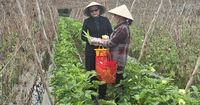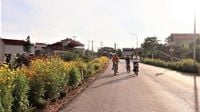In the first quarter of 2025, many households in Vietnam reported a decrease in income compared to the same period in 2024, primarily due to job losses and rising costs. According to recent data, 34.5% of households noted an increase in income, while 43.0% of those with reduced income attributed this decline to job loss or temporary work stoppage. Additionally, 22.7% cited a reduction in the scale of their production and business activities, 19.7% pointed to increased input costs, and 17.8% mentioned decreased selling prices of their products.
Despite these challenges, social security support has been a lifeline for many. As of March 25, 2025, over 20.5 trillion VND was allocated to various social security initiatives. In the same period, 14.0% of households interviewed reported receiving assistance from different sources, including 9.8% from relatives, 5.1% from local programs, 4.7% from national policies, and 1.9% from charitable organizations.
Moreover, the government has made strides in improving housing conditions. In 2025, the country supported the elimination of 168,027 makeshift and dilapidated houses, with 81,607 completed and 86,420 new units started. As of March 28, 2025, localities received 2,836.8 billion VND in support from various sectors, with 36 localities mobilizing over 2,832 billion VND for these initiatives.
In a broader context, Vietnam has made significant progress in rural development. By the end of March 2025, 6,001 out of 7,696 communes (78.0%) had met new rural standards, with 2,363 classified as advanced new rural communes. The average commune met 17.6 criteria, and 307 district-level units across 59 provinces achieved new rural standards, including 29 districts reaching advanced status.
In a related story, the David Duong Community Support Fund has been instrumental in helping families like that of Ms. Doan Thi Tuyen Trinh and Mr. Nguyen Xuan Thao from Long Thanh hamlet in Long An province. For over five years, their family has benefited from the fund, which has allowed them to transition from subsistence farming to more productive agricultural practices.
Ms. Trinh shared, “Receiving this capital has brought great joy and warmth to our family. Thanks to it, we can invest in short-term crops and gradually move to long-term crops, achieving positive results and improving our lives.”
Mr. Thao added, “In the initial stages, our family’s income was only 3-4 million VND per month, but now it has increased to 7-8 million VND monthly. We no longer worry about basic needs like food and clothing.”
Mr. Trinh Van Tuong, a 67-year-old farmer from Long Thuan commune, also praised the support he received. He has been able to develop high-tech sticky rice and expand his garden to include various crops and fruit trees. “Last year, our profit reached over 60 million VND, with each hectare yielding about 30 million VND. Thanks to this fund, my family’s life has changed significantly,” he expressed.
The David Duong Community Support Fund, founded by David Duong, aims to provide sustainable assistance to farmers. The fund operates on the principle of empowering individuals rather than providing direct handouts. “Instead of giving fish, the fund provides fishing rods,” Mr. Duong explained. “There’s no greater joy than seeing families escape poverty and children able to attend school.”
With a total capital of 1 billion VND, the fund has allocated resources to various community organizations, including 300 million VND to the District Union, 160 million VND to the District Women's Union, 290 million VND to the District Veterans Association, and 250 million VND to the District Farmers' Association.
As these initiatives unfold, the focus remains on creating a sustainable future for Vietnam’s rural communities. The combination of social security support and community-driven funding is helping many families improve their living conditions and economic stability.
In conclusion, while challenges remain, the resilience of Vietnamese households and the support from both government and community initiatives illustrate a collective effort towards economic recovery and social welfare. The ongoing commitment to rural development and social security is paving the way for a brighter future for many families across the nation.





